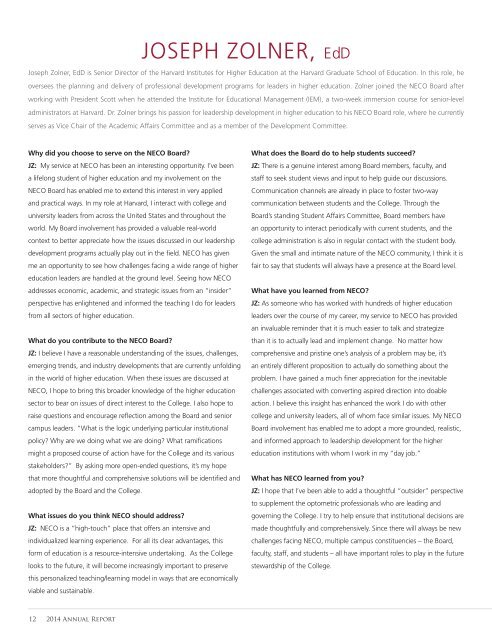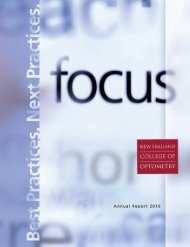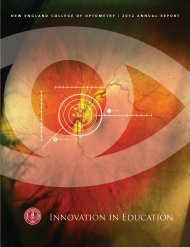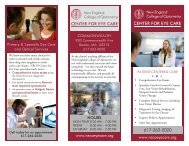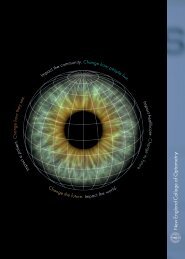2014 Annual Report
New England College of Optometry 2014 Annual Report
New England College of Optometry 2014 Annual Report
Create successful ePaper yourself
Turn your PDF publications into a flip-book with our unique Google optimized e-Paper software.
JOSEPH ZOLNER, EdD<br />
Joseph Zolner, EdD is Senior Director of the Harvard Institutes for Higher Education at the Harvard Graduate School of Education. In this role, he<br />
oversees the planning and delivery of professional development programs for leaders in higher education. Zolner joined the NECO Board after<br />
working with President Scott when he attended the Institute for Educational Management (IEM), a two-week immersion course for senior-level<br />
administrators at Harvard. Dr. Zolner brings his passion for leadership development in higher education to his NECO Board role, where he currently<br />
serves as Vice Chair of the Academic Affairs Committee and as a member of the Development Committee.<br />
Why did you choose to serve on the NECO Board?<br />
JZ: My service at NECO has been an interesting opportunity. I’ve been<br />
a lifelong student of higher education and my involvement on the<br />
NECO Board has enabled me to extend this interest in very applied<br />
and practical ways. In my role at Harvard, I interact with college and<br />
university leaders from across the United States and throughout the<br />
world. My Board involvement has provided a valuable real-world<br />
context to better appreciate how the issues discussed in our leadership<br />
development programs actually play out in the field. NECO has given<br />
me an opportunity to see how challenges facing a wide range of higher<br />
education leaders are handled at the ground level. Seeing how NECO<br />
addresses economic, academic, and strategic issues from an “insider”<br />
perspective has enlightened and informed the teaching I do for leaders<br />
from all sectors of higher education.<br />
What do you contribute to the NECO Board?<br />
JZ: I believe I have a reasonable understanding of the issues, challenges,<br />
emerging trends, and industry developments that are currently unfolding<br />
in the world of higher education. When these issues are discussed at<br />
NECO, I hope to bring this broader knowledge of the higher education<br />
sector to bear on issues of direct interest to the College. I also hope to<br />
raise questions and encourage reflection among the Board and senior<br />
campus leaders. “What is the logic underlying particular institutional<br />
policy? Why are we doing what we are doing? What ramifications<br />
might a proposed course of action have for the College and its various<br />
stakeholders?” By asking more open-ended questions, it’s my hope<br />
that more thoughtful and comprehensive solutions will be identified and<br />
adopted by the Board and the College.<br />
What issues do you think NECO should address?<br />
JZ: NECO is a “high-touch” place that offers an intensive and<br />
individualized learning experience. For all its clear advantages, this<br />
form of education is a resource-intensive undertaking. As the College<br />
looks to the future, it will become increasingly important to preserve<br />
this personalized teaching/learning model in ways that are economically<br />
viable and sustainable.<br />
What does the Board do to help students succeed?<br />
JZ: There is a genuine interest among Board members, faculty, and<br />
staff to seek student views and input to help guide our discussions.<br />
Communication channels are already in place to foster two-way<br />
communication between students and the College. Through the<br />
Board’s standing Student Affairs Committee, Board members have<br />
an opportunity to interact periodically with current students, and the<br />
college administration is also in regular contact with the student body.<br />
Given the small and intimate nature of the NECO community, I think it is<br />
fair to say that students will always have a presence at the Board level.<br />
What have you learned from NECO?<br />
JZ: As someone who has worked with hundreds of higher education<br />
leaders over the course of my career, my service to NECO has provided<br />
an invaluable reminder that it is much easier to talk and strategize<br />
than it is to actually lead and implement change. No matter how<br />
comprehensive and pristine one’s analysis of a problem may be, it’s<br />
an entirely different proposition to actually do something about the<br />
problem. I have gained a much finer appreciation for the inevitable<br />
challenges associated with converting aspired direction into doable<br />
action. I believe this insight has enhanced the work I do with other<br />
college and university leaders, all of whom face similar issues. My NECO<br />
Board involvement has enabled me to adopt a more grounded, realistic,<br />
and informed approach to leadership development for the higher<br />
education institutions with whom I work in my “day job.”<br />
What has NECO learned from you?<br />
JZ: I hope that I’ve been able to add a thoughtful “outsider” perspective<br />
to supplement the optometric professionals who are leading and<br />
governing the College. I try to help ensure that institutional decisions are<br />
made thoughtfully and comprehensively. Since there will always be new<br />
challenges facing NECO, multiple campus constituencies – the Board,<br />
faculty, staff, and students – all have important roles to play in the future<br />
stewardship of the College.<br />
12 <strong>2014</strong> <strong>Annual</strong> <strong>Report</strong>


